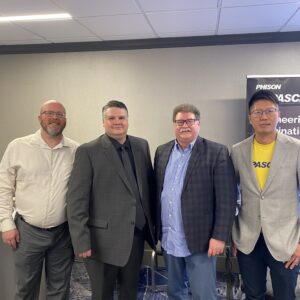|
|
 Sebastien Jean, Chris Ramseyer, Brian Cox, and Michael Wu presented for Phison at AI Infrastructure Field Day 2 |
This Presentation date is April 24, 2025 at 08:00 - 11:30.
Presenters: Brian Cox, Chris Ramseyer, Michael Wu, Sebastien Jean
Affordable on premises LLM training and inference with Phison aiDAPTIV+
Watch on YouTube
Watch on Vimeo
Phison’s show their aiDAPTIV+ technology, designed to make on-premises AI processing more affordable and accessible, particularly for small to medium-sized businesses, governments, and universities. The core of their innovation lies in leveraging flash storage to offload the memory demands of large language models (LLMs) from the GPU. This approach addresses the growing challenge of limited GPU memory capacity, which often necessitates buying more GPUs than needed, primarily for the memory capacity.
Phison’s solution enables the loading of LLMs onto high-capacity, cost-effective flash memory, allowing the GPU to access the necessary data in slices for processing. This significantly reduces the cost compared to traditional deployments that rely solely on GPU memory. The company is partnering with OEMs to integrate their technology into various platforms, including desktops, laptops, and even IoT devices, with a focus on providing pre-tested solutions for a seamless user experience. They are also expanding their partnerships to include storage systems.
Beyond hardware, Phison also addresses the knowledge gap in LLM training by offering educational programs and working with universities to provide students with access to affordable AI infrastructure. Their teaching PC, offered in partnership with Newegg, aims to democratize LLM training by making it accessible in classrooms. The company’s efforts focus on fine-tuning pre-existing foundational models with domain-specific data, allowing businesses and institutions to tailor AI to their unique needs and keep their data private.
Personnel: Brian Cox
GPU Memory Offload for LLM fine-tuning and inference with Phison aiDAPTIV+
Watch on YouTube
Watch on Vimeo
With aiDAPTIV+, Phison makes on-premises AI processing more accessible and affordable, especially for small and medium-sized businesses, government entities, and educational institutions. CTO Sebastien Jean explained that the primary goal of Phison’s solution is to facilitate fine-tuning of large language models (LLMs) on-site. Fine-tuning often demands significantly more memory than inference, making it expensive and difficult for those without massive budgets or a lot of resources. The presentation highlighted the massive memory requirements for fine-tuning, which can be up to 20 times the memory needed to run an LLM, driving up costs and making it impossible for some organizations to begin with this approach.
Phison’s solution addresses this challenge by decoupling compute and memory. Sebastien Jean, Phison’s CTO, focused on how Phison’s technology, with its AI-optimized SSDs and middleware, enables on-site LLM training and inference. The product uses a combination of their proprietary middleware, Adaptive Link, and custom-built ProSuite software to manage and extend the memory available to PyTorch, effectively turning an SSD into an extended memory pool. This architecture allows for training large models using fewer GPUs. The system uses a software layer within PyTorch that intercepts calls and then offloads slices of the model to the SSD, which helps in memory management.
By leveraging SSDs and their proprietary controller technology, Phison offers a cost-effective alternative to expensive GPU-intensive setups and targets the SMB, government, and education markets with this solution. The presentation concluded with a focus on the financial benefits and the sustainability of the solution. By allowing for more efficient hardware utilization, Phison provides not just a financially smart solution but one with power and cooling benefits as well. Also, by using repurposed NAND, the solution can increase the lifespan of hardware, reduce electronic waste, and extend the useful life of data center infrastructure.
Personnel: Sebastien Jean
Innovation in the enterprise SSD market driven by Phison
Watch on YouTube
Watch on Vimeo
Phison, a leading innovator in the enterprise SSD market, is driving the future of data-intensive applications with its Pascari SSDs. Michael Wu, GM & President, presented at AI Infrastructure Field Day, highlighting Phison’s commitment to innovation, focusing on performance and reliability in the enterprise space. Wu shared insights into the company’s journey, from its origins as an engineering-focused company to its current status as a $2 billion enterprise, and its evolution from a behind-the-scenes technology provider to a brand recognized for its cutting-edge SSD solutions.
Phison is uniquely positioned to meet the evolving needs of the enterprise market. Their strategy revolves around a vertically integrated approach, encompassing controller, firmware, and hardware design, allowing them to offer customized solutions through their Imagine Plus design service. This focus on customization, coupled with their early adoption of dual-port technology for enterprise applications and a commitment to providing legacy support, sets them apart. They also emphasize their commitment to innovation with their world’s first achievements and unique NAND emulator system.
Looking ahead, Phison is strategically expanding into the enterprise market. They are investing heavily in R&D, with 75% of their workforce dedicated to it. Furthermore, Phison is actively establishing regional presences through joint ventures and partnerships, particularly in India and Malaysia, to provide local customers with tailored solutions. Their approach to the market, supported by their proprietary NAND emulator, allows Phison to be first to market with new technologies. As a result, they anticipate substantial growth in enterprise revenue, fueled by the rising demand for high-density storage solutions and their commitment to being the leader.
Personnel: Michael Wu
The Pascari SSD portfolio by Phison
Watch on YouTube
Watch on Vimeo
This Phison presentation at AI Infrastructure Field Day showcased their Pascari SSD portfolio, emphasizing innovation in the enterprise SSD market through performance and reliability. The presentation, led by Chris Ramseyer, focused on Phison’s high-performance Pascari Enterprise X series, designed for data-intensive applications like AI and machine learning. The X series boasts impressive speeds, including up to 15 GB/s sequential read performance and 3.2 million IOPS, positioning it as a leader in the market. The discussion highlighted the shift in data center workloads due to AI, particularly the need for higher queue depths and increased read bandwidth.
The presentation delved into the specifics of Phison’s SSDs, highlighting their various form factors and benefits, such as increased storage density and sustainability through improved power efficiency. The Pascari D-series, in particular, was showcased for its high capacity, with the D205V reaching 122.88 TB, and different form factors, including E1.S. Phison also demonstrated their customization capabilities, emphasizing collaborations, for example, with VDURA, which allows them to tailor their products to meet specific customer needs. In addition, Phison also offers boot drives and SATA drives to the legacy market.
The presentation concluded with three key takeaways: Phison’s broad portfolio and deep expertise, their status as a trusted innovation partner, and their unmatched flexibility, reliability, and performance across hyperscale, AI, and legacy systems. The presentation underscored Phison’s commitment to innovation, evidenced by their vertically integrated approach with in-house IP, controller knowledge, and testing capabilities. The team also highlighted the value of their products used in space and how their technology “trickles down” for use on Earth. Overall, Phison presented itself as a flexible and capable partner for enterprises seeking high-performance, reliable, and customizable SSD solutions to meet the evolving demands of modern data-intensive workloads.
Personnel: Chris Ramseyer








